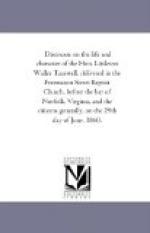Another leader of the bar was the venerable James Nimmo. His tall form, neatly attired in black, and bent low as in grateful obeisance to the rapid years which were bringing him nearer to his heavenly home; that broad belt of baldness that stretched over from his forehead to his spine, those silver side-locks that ran wild about his collar, that honest, peculiar voice, which sounded as if virtue and piety, descending awhile from the upper sphere, were helping the old man out in his speech; with the freshness of yesterday I see and hear them all. Though seemingly attended by celestial visitants, and perhaps for that reason, he had not a particle of Young America about him. He believed that rogues and scamps ought to be punished as promptly and as condignly now as in the days of Abraham, of Isaac, and of Jacob, and as in the days of his own early youth; and while he was the aid and comforter of the widow and the fatherless, and of the virtuous poor,—would weep and pray with them, and help them out of that slim purse, which never held an unworthy shilling, he was, as Commonwealth’s attorney, the terror of evil-doers. I remember on one occasion, when he was prosecuting a notorious offender whom he sent to the penitentiary, and who was defended by Gen. Taylor, as the old man was bald, and the air of the old court-house was damp, he threw over his head a red bandanna handkerchief, and I hear the laugh which Gen. Taylor extorted from the bench, from the jury, and from the old man himself, by calling it a bloody flag. He was of that substantial class of lawyers, who, having received an elementary grounding in Latin and mathematics in the schools of the time, entered the clerk’s office, and served a term of duty within its precincts. He was thus well versed in the ordinary forms of the law, and with the decisions of the courts in leading cases; and took the hue rather of an attorney than of an advocate. With such men as a class, there was no great intimacy with the law as a science, and its higher philosophy was beyond their reach. Like Mathews, however, he had always lived in sea-ports, and as he studied his cases well, he was always very impressive with the jury, and was heard with great respect by the court; and when he had reached the




